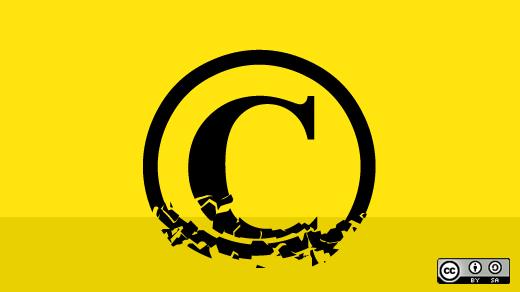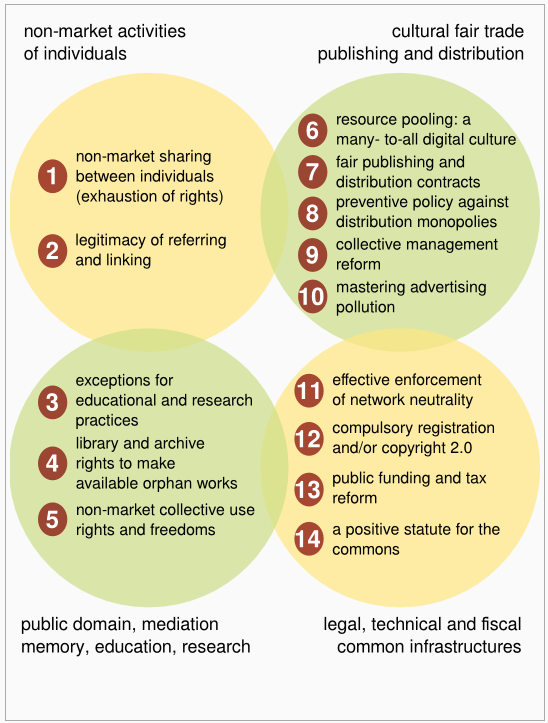14 Points Towards a Reformed Copyright and Culture | PirateTimes

14 Points Towards a Reformed Copyright and Culture
This proposal of a copyright and culture reform was drafted by Philippe Aigrain, with contributions from Lionel Maurel and Silvère Mercier and was critically reviewed by the co-founders and staff of La Quadrature du Net. The proposal comes as a response to the ACTA rejection as a way to create a new regulatory and policy framework which has been adapted to our new digital era. The proposal looks at the challenges for the reform and possible solutions in order to accomodate for them with new possibilities.
The below text is a loosely translated summary of the points from the Spanish summary of the proposal. You can find the full version of the text in English [pdf], French [pdf] and Spanish [pdf].
edit: This post has been translated to Russian http://pirates.by/news/155
—

1. Giving legal recognition to the non-market sharing of digital works between individuals through the exhaustion of rights doctrine
This discusses sharing digital work between friends. The section of culture that is outside the market, especially concerning peer-to-peer file sharing.
2. Legitimacy of referring and linking
Creating link directories to digital archives ought to be considered a legitimate act and counted under the laws of freedom of expression and information in the digital area.
3. Solid exceptions for educational and research practices
Usage for education and research practices ought to be protected legally with plenty of liberties for using works protected by copyright. These exceptions to copyright law should be under strict conditions of not generating financial compensations of any kind for institutions or individuals. The exceptions need to be clear and not leave space for ambiguity for the ones using them.
4. Library and archive rights to make available orphan works free-of-charge and with wide use rights
Libraries and Archives should have a wide liberty in making orphan works available to the public in multiple formats, including digital formats. The orphan works should be made available for anyone to access and use without generating financial compensation or legal ambiguities and risk for making the works available.
5. Freedom of non-market collective use
The non-profit use of works play an essential role in the knowledge and participation of cultural life. Therefore a framework of laws must cover the public use of works in spaces such as libraries and museums in a similar way as defined in point 1.
6. Resource pooling: new financing sources adapted to digital culture and its many contributors and projects
Today different support schemes exist that allow works that are hard to monetize but still socially valuable to exist. There needs to be new public policies employed that explore, test and construct new incentive schemes for arts and culture whilst avoiding monopoly privileges.
7. Legal requirements for fair publishing and distribution contracts
Today many contracts are governed by customs of use, which in many cases impose unfair conditions by the publishers and distributors on the authors/artists for the transfer of rights for the works. This playing field needs to be leveled for authors, collaborators and the public by clearly establishing contractual limits and exhaustion of rights.
8. A preventive competition policy against distribution monopolies and their abuse
The merging of distributing companies create unequal rights for two groups:
- For the creators because they are limited from showing their works in alternative channels and can’t negotiate better contracts
- For the public because it forces them to pay monopoly prices for the works. This situation needs to be avoided through regulations around fair competition and developing incentives for local content distributors.
9. Reform of collective management
Collecting societies currently have a monopolistic character which hurts the freedoms of creators to choose their own representatives. Management practices needs to be more transparent and administration costs should not exceed similar tax collection agencies. They should also be subject to control by an independent third party.
10. Keeping pollution by advertising under control
Internet advertising is an excellent channel for generating income for creators and their works. However, this needs to be regulated to avoid tricking customers and allowing them an ability to block it with some sort of software.
11. Effective norms for the enforcement of network neutrality
A technological infrastructure is needed for the development of a large digital culture that is rich in content and sustainable through time. It needs to be a free and open structure but it also needs to avoid: monopolies dominating the markets, DRM equivalents to lock content into technical restraints, filtering, censorship and discriminations against protocols/applications/sources.
12. Compulsory registration or copyright 2.0
The automatic protection mechanisms for copyright declared in the Berne Convention has left a multitude of works unusable through being orphan works, lack of commercial interest or legal difficulties in re-using the work in new contexts. The current copyright system also leaves unjust incomes for people that have not participated in the creation of the work (such as heriditary or editorial rights). Instead there should be mechanisms for renewable rights over time that defaults, unless otherwise specified, for a re-production and adaptation of published works for the digital environment.
13. Cultural public funding and tax reform
Any reform needs to analyze the areas where state intervention is essencial to ensure a guaranteed cultural sustainability. The public interventions need to be oriented towards maintaining the cultural basic activities: preserving, making available and utilizing our cultural heritage. It also needs to ensure that costly projects and structures are allowed to exist. It is important that any tax reform considers the factor that supportive public action is needed to ensure cultural sustainability. Even though this is the case it is important that this financial mechanisms does not implicate the removal of other rights, such as is the case today with the ruling paying public.
14. A positive statute for the public domain and the voluntary commons
Any extension of monopoly rights, the width of copyright restriction or increased access restrictions to a work needs to be analyzed under the scrutiny of violations in cultural rights that such changes would have. We also need to reverse the situation of where public domain is regarded as a failure or area lacking privatization; an area where people are allowed a tolerance to use the work because the market has failed to.
Featured picture: CC-BY-SA, opensourceway
Other picture: CC -BY-SA, Philippe Aigrain
About Josef Ohlsson Collentine
I’m a dual citizen (American/Swede) and try to integrate my reflections from a more global perspective if possible. I’m the organizational leader for Pirate Times and work actively to strengthen the pirate movement through this work as well as being the international contact for Piratpartiet (PPSE). Elected board member of PPSE for 2015-2018.
If you would like to ask me something I speak English, Swedish and Spanish. Find me on the links below
All content is CC-BY if not mentioned otherwise. Please link back to us if using content.
-
- Pingback: Flattr Appreciation During November 2013, Euro 11.54 | PirateTimes()
-
- Pingback: Flattr Appreciation During January 2014, Euro 14.56 | PirateTimes()














Recent Comments